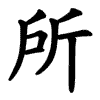所
- place, location;
- that which, what (nominalizer);
Etymology
Phono-semantic compound:
斤 (axe) – semantic, originally indicating chopping or cutting.
戶 (door, household) – phonetic element.
According to Shuowen Jiezi, the earliest sense was the sound of chopping wood (as in 詩經 伐木所所).
Later borrowed to mean “place” and further extended to mark nominalized verb phrases, functioning like “that which …” or “…-ing” in Classical Chinese.
In early scripts (bronze inscriptions, bamboo slips), the strokes of 戶 and 斤 were often merged, producing variants.
Usage in Korean
住所 (주소) – residence
場所 (장소) – place, venue
研究所 (연구소) – research institute
所謂 (소위) – so-called, “what is called”
所有 (소유) – possession, ownership
Additional notes
In Classical Chinese grammar:
所 + verb → nominalized phrase (e.g., 所見 “what is seen”).
verb + 所 → “place where [verb happens]” (e.g., 居所 “the place one lives”).
Alternative forms
Multiple historical variants exist:
齭, 㫹, 乺, 㪽 etc.
Words that derived from 所
- 교도소(矯導所)–prison; jail
- 구치소(拘置所)–detention house; lockup
- 변소(便所)–lavatory
- 산소(山所)–grave; tomb; graveyard; burial ground
- 상담소(相談所)–counseling center; consultancy; counseling service agency
- 세탁소(洗濯所)–laundry
- 소기(所期)–expectation; anticipation
- 소망(所望)–wish; hope; desire
- 소산(所産)–product; goods; fruit; outcome
- 소용(所用)–use; good
- 소용없다(所用없다)–useless; fruitless; futile
- 소원(所願)–wish; hope
- 소위(所謂)–as they say; so-called
- 소유(所有)–ownership; possession
- 소유권(所有權)–ownership
- 소유물(所有物)–possession; property
- 소장(所藏)–possession
- 소재(所在)–being located; existing; location; site
- 업소(業所)–business; establishment; shop
- 이발소(理髮所)–barbershop
- 입소(入所)–entrance; admission
- 장소(場所)–place; venue; space
- 투표소(投票所)–polling place
- 훈련소(訓鍊所)–training camp; training center; training school
- 휴게소(休憩所)–rest area; service area
- 竹尸竹一中 (HSHML)
- ⿰ 戶 斤 (G T K)
- ⿰ 戸 斤 (J)
